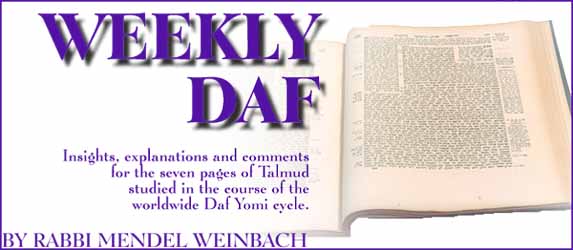Weekly Daf #278
Beitza 12 - 18 Issue #278
25 Sivan - 1 Tammuz 5759 / 9 - 15 June 1999
This publication is also available in the following formats: ![]()
![]()
![]() Explanation
of these symbols
Explanation
of these symbols
That "Extra" Soul
"Neshama yeteira" (extra soul) is what our Sages call that extra dimension of spirituality which Heaven instills in a Jew before Shabbat. The practical expression of this extra dimension of soul, explains Rashi, is that the Jew has a greater capacity for relaxation and joy, and is capable of eating and drinking in abundance without becoming disgusted.
When Shabbat ends, the neshama yeteira is taken away. The spiritual trauma which the Jew may feel at this loss is subtly indicated in the word "vayinafash" (Shmos 31:17) which describes G-d's rest following the six days of creation. This can be read as a combination of two words "vay nefesh" which means "woe to the soul which has been lost."
To ease this loss, our Sages instituted the practice of smelling "besamim" (fragrant spices) during the havdalah service at the Shabbat conclusion. Fragrance is the only earthly thing which the soul enjoys, and it is this nourishment which enables the remaining soul to overcome the shock of losing its Shabbat companion.
What about the holidays - does one get a neshama yeteira on those days as well?
Yes, contends Rashbam (Pesachim 102b), and his proof is that we do not include the blessing on besamim in the combination kiddush-havdalah we recite when the Shabbat conclusion is also the eve of a holiday. The reason, he concludes, must be that the neshama yeteira is present on the holiday as well.
Tosefot (Beitza 33b) challenges this conclusion: If a neshama yeteira is present on a holiday, then we should include besamim in our havdalah at the conclusion of every holiday. Since we do not do so, there must be no neshama yeteira on a holiday. Rather, we are compelled to find another reason for not including besamim in the kiddush-havdalah recited on a holiday eve following Shabbat.
After rejecting some other approaches to this problem, Tosefot concludes that the luxurious eating and drinking which bring joy to a Jew on a holiday have the same spiritually therapeutic effect as besamim, and therefore render them unnecessary.
The Danger of Deception
On a holiday preceding Shabbat, it is only permissible to cook or bake the Shabbat food if one has made an "eruv tavshilin." One does so by preparing, on the day preceding the holiday, a baked item and a cooked item (such as challah and fish or meat) which will be eaten on Shabbat. This lets us view the cooking on the holiday as only an extension of the cooking done before the holiday, and will not lead to the mistaken notion that one may cook on a holiday for consumption the next day when the next day is not Shabbat.
If someone forgot to make an eruv tavshilin, and no one made one on his behalf, he must transfer ownership of his food supplies to a Jew who has made an eruv tavshilin, and that person may do the cooking on his behalf.
Should the one who forgot to make the eruv ignore this restriction and proceed to cook, our Sages make and interesting distinction as to when we penalize him by prohibiting consumption of this food and when we do not:
If he intentionally violated the halacha, cooking despite his lack of an eruv, we allow him to eat that food on Shabbat. But if he does this cooking in a deceptive fashion - such as cooking more than he needs for the holiday meals by falsely declaring that he expects guests, when his real intention is to prepare food for Shabbat -he is forbidden to eat that food on Shabbat.
Why did the Sages penalize the one who cooks for Shabbat through deception and not the one who willfully violates the halacha?
The explanation, says Rashi, is that there is no danger that other people will follow in the path of the sinful person who willfully violated halacha; and, he too will realize the error of his ways and repent. There is thus no threat to the institution of eruv tavshilin. In the case of deception, however, he fools himself into thinking that he acted properly, and others may learn from his will to get around the law. Since this threatens the very survival of eruv tavshilin, our Sages penalized him such that the food cannot be eaten on Shabbat.
General Editor: Rabbi Moshe Newman
Production Design: Eli Ballon
© 1999 Ohr Somayach International - All rights reserved. This publication may be distributed to another person intact without prior permission. We also encourage you to include this material in other publications, such as synagogue newsletters. However, we ask that you contact us beforehand for permission, and then send us a sample issue.
This publication is available via E-Mail
Ohr Somayach Institutions
is an international network of Yeshivot and outreach centers, with branches in North America, Europe, South Africa and South America. The Central Campus in Jerusalem provides a full range of educational services for over 685 full-time students.The Jewish Learning Exchange (JLE) of Ohr Somayach offers summer and winter programs in Israel that attract hundreds of university students from around the world for 3 to 8 weeks of study and touring.
Dedication opportunities are available for Weekly Daf. Please contact us for details.







